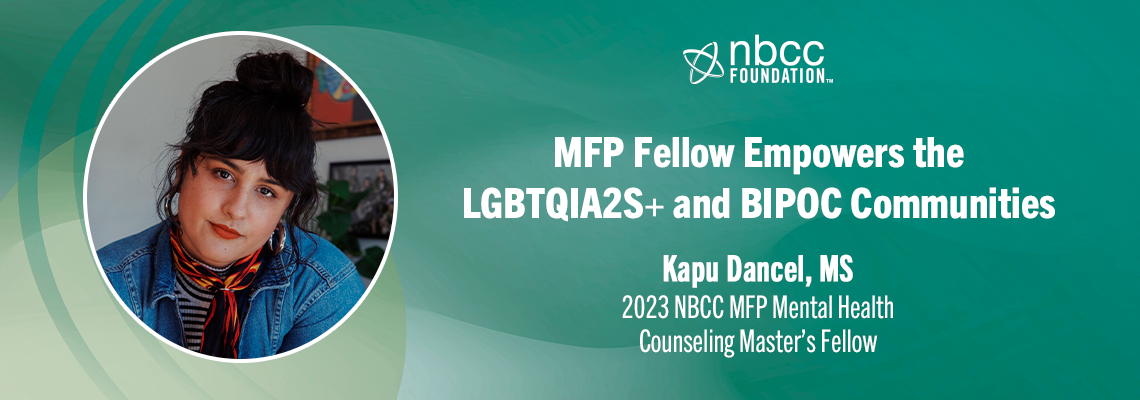
Foundation Connections

MFP Fellow Empowers the LGBTQIA2S+ and BIPOC Communities
Published 6/25/2024
Like many others, the road to becoming a counselor hasn’t been easy for 2023 NBCC MFP Mental Health Counseling Master’s Fellow Kapu Dancel, MS. Though she planned to move toward counseling immediately following undergraduate school, her plans were derailed, not only by the global pandemic but by facing a challenging journey of personal healing.
“At one of my lowest points, I felt like I was in a cross between a tailspin and an explosion. I found myself in counseling, and it kept me alive.” Finding and experiencing that safe space allowed Kapu to delve deep into herself. “Counseling provided me a place to contend with all the rules I had swallowed in service of survival; the very rules that were choking me and keeping me in the dark.”
It was there that Kapu found her inspiration to continue the path to becoming a counselor. “Falling upward and the global pandemic forcing me to pause caused a change in me. I finally felt ready to hold space for others while not abandoning myself.”
Though Kapu lives in a city and community that has an active LGBTQIA2S+ community, she still experiences challenges. “The challenges I’ve experienced most have centered on the intersection of being a BIPOC and Queer person in a predominantly White city. Although I’ve lived in this city for quite some time, I hail from Hawai’i where diversity looks and feels very different. If you’re unable to find your pockets of community, it is very easy to feel ‘wrong’ for simply existing.”
It is through these challenges that Kapu found her passion. “The BIPOC and Queer communities are my home, and I know just how much they contend with. I feel privileged to come alongside these populations, to be welcomed in and trusted. These communities pour into me, and it’s my honor to pour back.”
“I wish I had a magic secret,” Kapu stated when asked if she had any advice for others facing similar challenges. “It takes time to find a community that can hold the importance and nuance of intersectionality. It will hold you better and it will grow you more deeply. And if that is not accessible, reach across cities, state lines, and even countries.” She went on to offer words of encouragement. “You are needed in this world in a mighty way. I am rooting for you.”
Despite everything, Kapu has accomplished a lot over the last 3 years, from graduating on June 16 to developing as a Gestalt counselor. She has also utilized her nonprofit, ‘Iolana Collective, to host a creative movement workshop for adults in the LGBTQIA2S+ and BIPOC communities.
“I don’t know how to share in writing what these workshops do for myself and these communities. Understanding that emotional trauma is physical trauma deeply impacts my approach. When I cultivate a space focused on ‘creative movement,’ I am cultivating a space where people are invited to be with the whole of who they are, within themselves and in relationship to their environment and communities. This is especially powerful when so many systems require the individual/community to creatively adapt in service of survival while abandoning their own needs, dreams, and sense of connection.”
Whether they identify as LGBTQIA2S+, BIPOC, or neither, Kapu believes counselors should consider several things. “There are a million ways to be in this community and no one-size-fits-all. If you want to work with this population, remain curious and phenomenological. And be teachable—you will get things wrong, and it’s about how you repair and take responsibility for your own learning, self-development, and humility.”
Understanding and empowering clients is an important aspect of being a counselor. As a member of the LGBTQIA2S+ and BIPOC communities, Kapu has some advice for how counselors can do this.
“As I mentioned before, I believe that leaning into a more phenomenological approach is an asset here. Whether you’re a part of these communities or not, one can’t know the exact lived experience of the other based purely on a label/identity. I have found that being patient and caring enough to step into the other’s world while proactively bracketing my own judgments and meaning is most powerful and empowering. These communities are made to hide and contort within so many environments, so consider how powerful of an intervention it is to have the counselor, in a position of power, closely tend to the lived experience of the client in a way that does not seek to change, but to genuinely understand. Being tended to and witnessed in this way is powerful.”
Through her experiences, Kapu has set goals she is working daily toward achieving. She plans to open a private practice to focus on individuals, relationships, and groups via Medicaid. She hopes to contribute to making private practice care more accessible while still being deeply connected to community care. She also plans to build on ‘Iolana Collective to expand its programming, secure funding, and partner with local organizations.
Kapu’s lived experiences provide her with a strong foundation, and her devotion to working with these underserved communities will help her succeed in all of her future goals.

